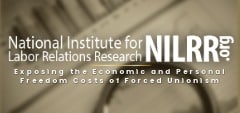Government Union Bosses vs. Customer Service

The DC Metro system is still tripping up – Washington Post

Late last month, the manager of the D.C. Metro system admitted to the Washington Post that government-mandated union monopoly bargaining prevents him from hiring station managers based on their “ability to operate in a customer-friendly way.” Image: Steven White’s Accidental Urbanist blog
Recently, the detrimental impact of government union monopoly bargaining on public transportation was highlighted by a disruptive strike against the Bay Area Rapid Transit (BART), which is supposed to serve San Francisco and its surrounding regions. Hundreds of thousands of people either had to stay home or find other ways to get to their jobs, schools, and other destinations.
As Chris Edwards of the Cato Institute observed in a commentary late last week (see the first link above), while strikes tend to receive a lot of media attention, they are far from the only way in which union officials wielding the legal privilege to act as public employees’ “exclusive” bargaining agents on matters concerning their pay, benefits, and work rules cause problems in government. Union bosses systematically “push up operating costs” and “reduce service quality.”
Edwards quotes from a June 30 Washington Post report by editor Fred Hiatt in which he recounted a discussion he and other Post editorial board members had had a few days earlier with Richard Sarles, general manager of the D.C. Metro system. (See the second link above.) Hiatt complained to Sarles about how, the night before their June 26 discussion, he had found himself on a “sweltering” and “frighteningly dark” platform at Union Station for 15 minutes as he waited for a train. Why were there no Metro people advising people at the street level not to descend into the “rancid darkness” until a train was close, Hiatt asked Sarles?
Sarles admitted his organization’s customer service is not good. But, by his own account, Big Labor special privileges leave him with little ability to improve it:
Sarles acknowledged that employee interaction with riders, especially during crises, still needs work. “If I had my druthers,” he said, he would hire station managers based on “the ability to operate in a customer-friendly way.”
But, Sarles said, Metro’s collective bargaining agreement requires him to promote bus drivers to train operators and station managers. In fact, his spokesman said, mediocre bus drivers may get promoted more quickly because “we need to get you from behind the wheel.”
And if someone does a great job as station manager, “I can’t recognize that financially,” Sarles said. Good employees can be rewarded with lunches with the boss – him – or saluted at board meetings.
Could the agreement be changed to allow for merit pay? Sarles said any disagreement with the union goes to binding arbitration. Arbitrators “tend to sweep away any non-economic issues .”‰.”‰. That’s the deal you’re dealt, you have to work around it.”
As Edwards correctly points out, what this ultimately means is that “the ‘manager’ of a government agency . . . doesn’t even have the authority to manage his own workforce.” And since roughly 40% of all state and local government employees nationwide are currently subject to union monopoly control, the problems of the D.C. Metro system are being replicated in a wide array of public agencies in localities across the country.

